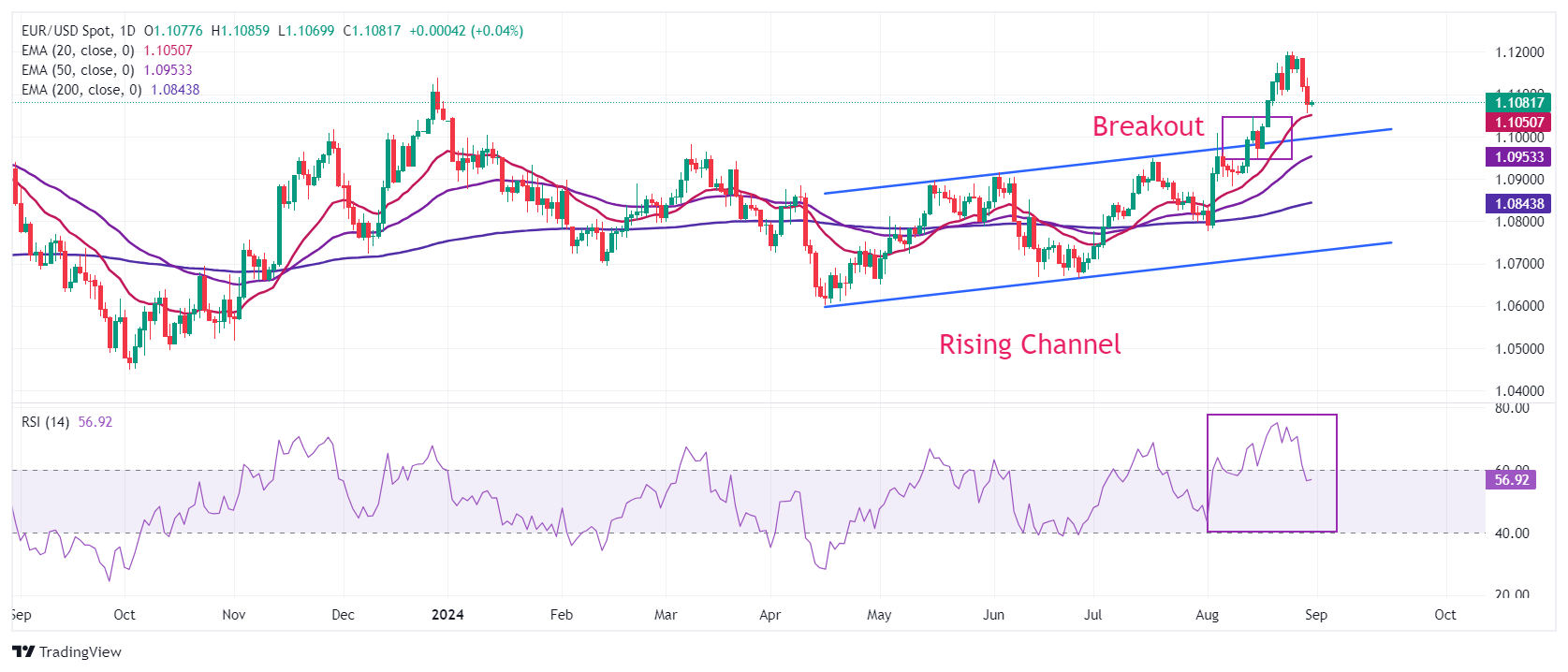EUR/USD declines toward 1.1000 as firm ECB rate-cut prospects weigh on Euro

- EUR/USD falls to near 1.1050 as the Eurozone inflation declines in line with estimates.
- Soft German inflation already boosted hopes of another ECB interest-rate cut in September.
- US PCE inflation for July rose steadily and remains softer than estimates.
EUR/USD edges lower and remains below 1.1100 in Friday’s North American session. The major currency rises as the US Dollar (USD) adds little gains despite the United States (US) Personal Consumption Expenditure Price Index (PCE) report showing that price pressures rose slower than expected in July. The US Dollar Index (DXY), which tracks the Greenback’s value against six major currencies, rises to near a fresh weekly high of 101.58.
The PCE report showed that year-over-year core inflation rose steadily by 2.6%, slower than estimates of 2.7%. Month-on-month inflation grew in line with estimates, and the former release of 0.2%. The Federal Reserve (Fed) is almost certain to start reducing interest rates from the September meeting. However, signs of stickiness in the inflation data has weighed on market expectations for pivoting to policy normalization aggressively.
According to the CME FedWatch tool, 30-day Federal Funds Futures pricing data shows that the likelihood of a probability of 50-basis points (bps) interest rate reduction in September is 30.5%, down from 36% recorded a week ago.
The likelihood of a bigger rate cut is also diminished by the upwardly revised Q2 Gross Domestic Product (GDP) estimates. The US Bureau of Economic Analysis (BEA) reported on Thursday that the pace at which the economy grew in the second quarter was higher than preliminary estimates. The agency reported that the economy grew at a robust pace of 3% on an annualized basis, against the flash projections of 2.8%.
Daily digest market movers: EUR/USD falls on soft Eurozone inflation
- EUR/USD stays below 1.1100 in Friday’s New York session as the Eurozone flash annual Harmonized Index of Consumer Prices (HICP) declines expectedly in August. A preliminary HICP report showed that the headline inflation decelerated to 2.2% from 2.6% in July due to lower energy prices. In the same period, the core HICP – which excludes volatile components like food, energy, alcohol, and tobacco – grew by 2.8%, slower than the former release of 2.9%.
- The preliminary inflation data is expected to strengthen market speculation for the European Central Bank’s (ECB) September interest rate cuts and, more broadly, the policy-easing path for the remainder of the year.
- Financial market participants already seem to be confident that the ECB will cut its key borrowing rates in September again. The ECB pivoted to policy-normalization in June but left interest rates unchanged in August. Market expectations for ECB September rate cuts increased sharply after data released on Thursday showed that price pressures in the Eurozone’s largest nation, Germany, returned to 2% for the first time in more than three years. Also, the economy is exposed to a technical recession as it contracted by 0.1% in the second quarter of this year and its economic outlook is vulnerable. Other Eurozone economies, such as France or Spain, have also seen a significant inflation decline in August.
- “Fading inflationary pressure combined with fading growth momentum offers an almost perfect macro backdrop for another rate cut,” said Carsten Brzeski, global head of macro at ING, in a note on Thursday.
- The ECB is also expected to deliver an additional interest rate cut somewhere in the last quarter of this year.
Technical Analysis: EUR/USD falls to near 1.1050
EUR/USD trades inside Thursday’s trading range after steading below the crucial resistance of 1.1100. The near-term outlook of the major currency pair is still firm as all short-to-long-term Exponential Moving Averages (EMAs) are sloping higher. Also, the major currency pair holds the breakout of the Rising Channel formation on a daily timeframe.
The 14-day Relative Strength Index (RSI) has declined below 60.00 after turning overbought near 75.00.
On the upside, a recent high of 1.1200 and the July 2023 high at 1.1275 will be the next stop for the Euro bulls. The downside is expected to remain cushioned near the psychological support of 1.1000.
